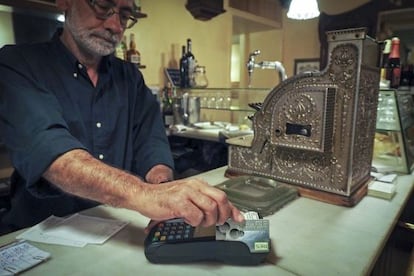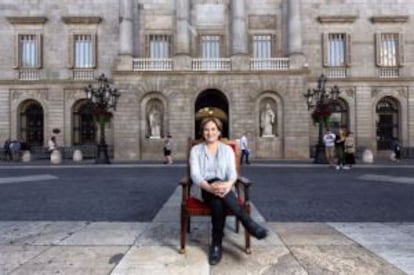An alternative currency for Barcelona?
Mayor campaigned on promise to create a new form of payment to boost local trade

During her election campaign, the new mayor of Barcelona dropped hints about her plans to create an alternative currency for use in the Catalan capital.
Ada Colau, a social activist who made a name for herself fighting against home foreclosures, is now in a position to make good on her vision after taking office last Saturday.
The idea is for local stores and residents to be able to exchange euros for this new currency, and use it to purchase products and services at a discount or with other kinds of advantages. Municipal workers may also receive part of their salary in the new money. The exchange rate would be one-to-one.
Firms that sign up see revenue grow between three and five percent, say managers of Girona’s res currency
Joan Ribó, the new mayor of Valencia and a member of Compromís, a regional leftist party, also made a similar proposal during his campaign.
Neither of the two projects is revolutionary. In fact, there are numerous precedents, both in Spain and elsewhere: the Bristol pound in Britain, the chiemgauer in the German region of Bavaria, the sol-violette in the French city of Toulouse, the ekhi in Bilbao, the res in Girona, and the puma in Seville.
The scope of each varies greatly: while the Toulouse currency is used by around 200 businesses, a Swiss alternative currency called the wir is employed by around 45,000 firms.
Nor is Barcelona the first local government to consider paying part of its workers’ wages in local currency.
“The mayor of Bristol accepted being paid his entire salary in social currency,” explains Ciaran Mundy, director of the Bristol Pound Community Interest Company. “Other workers in the council also get part of their wages in this currency.” Like other alternative currencies, the Bristol pound is backed by a local financial institution.
Andreu Honzawa, of the Social Trade Organisation, a foundation specializing in alternative currencies, says that in Switzerland, the partner bank offers participating businesses loans at lower interest rates than the rest of the economy, in the one-percent range. This means that small and medium companies can access cheap credit during a recession and maintain their purchasing power, he adds.
But there are risks involved in inventing a whole new form of payment, warns José Carlos Díez, a lecturer at Alcalá de Henares University. Paying part of the municipal force’s wages in local currency “is the worst way of increasing public spending,” he says.
And if the new currency lacks a financial institution to back it up with euros, it could lose credibility and thus value, and hyperinflation would set in. Díez mentions the case of Argentina, where public workers were paid in several parallel currencies that gradually depreciated. That is why this expert predicts that Barcelona’s municipal workers will prefer to be paid in euros.

But Juan Torres, who teaches at Seville University, disagrees. For that situation to happen, he says, there would have to be more currencies than the economy requires, and that is an unlikely scenario in Spain, where supply outstrips demand. These other currencies would complement the euro and “invigorate commercial supply.”
José García Montalvo, a professor of economics at Pompeu Fabra University, sees another drawback: the shortage of businesses to spend the money in.
“If you can only spend it in a few places and there is little use to it, people will prefer the euro,” he notes.
So far, one of the most successful experiments in Spain is the res, in use in the Catalan city of Girona. “Businesses that sign up see their revenue grow between three and five percent,” says a spokesperson for the managing company. The res is used by 444 small and medium businesses, twice as many as in 2013, and by over 3,000 citizens.
But Spain lacks a legal framework for these other forms of payment. Businesses can only pay their value-added taxes in euros. The organizers of the Bristol pound negotiated with local authorities to allow participants to pay their taxes in the local currency, explains Michael Lloyd-Jones, chief manager of the Bristol pound. “This helped businesses see that it’s legitimate.”
Tu suscripción se está usando en otro dispositivo
¿Quieres añadir otro usuario a tu suscripción?
Si continúas leyendo en este dispositivo, no se podrá leer en el otro.
FlechaTu suscripción se está usando en otro dispositivo y solo puedes acceder a EL PAÍS desde un dispositivo a la vez.
Si quieres compartir tu cuenta, cambia tu suscripción a la modalidad Premium, así podrás añadir otro usuario. Cada uno accederá con su propia cuenta de email, lo que os permitirá personalizar vuestra experiencia en EL PAÍS.
¿Tienes una suscripción de empresa? Accede aquí para contratar más cuentas.
En el caso de no saber quién está usando tu cuenta, te recomendamos cambiar tu contraseña aquí.
Si decides continuar compartiendo tu cuenta, este mensaje se mostrará en tu dispositivo y en el de la otra persona que está usando tu cuenta de forma indefinida, afectando a tu experiencia de lectura. Puedes consultar aquí los términos y condiciones de la suscripción digital.








































